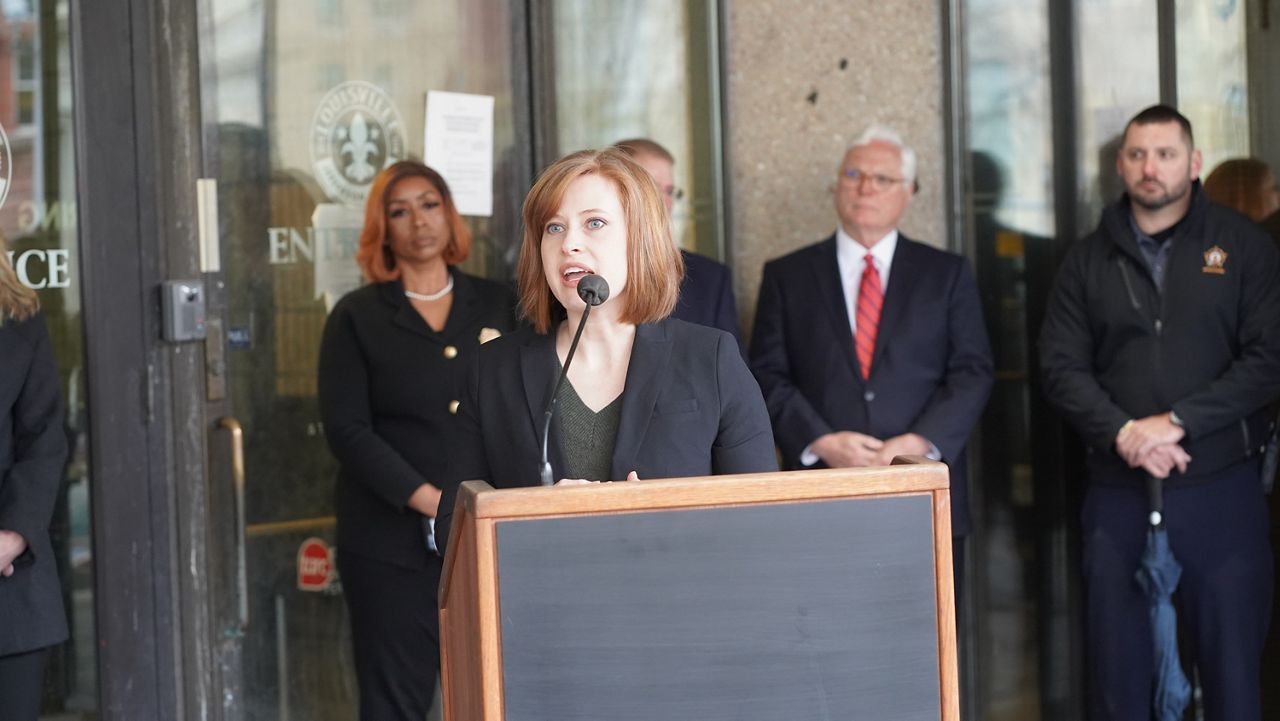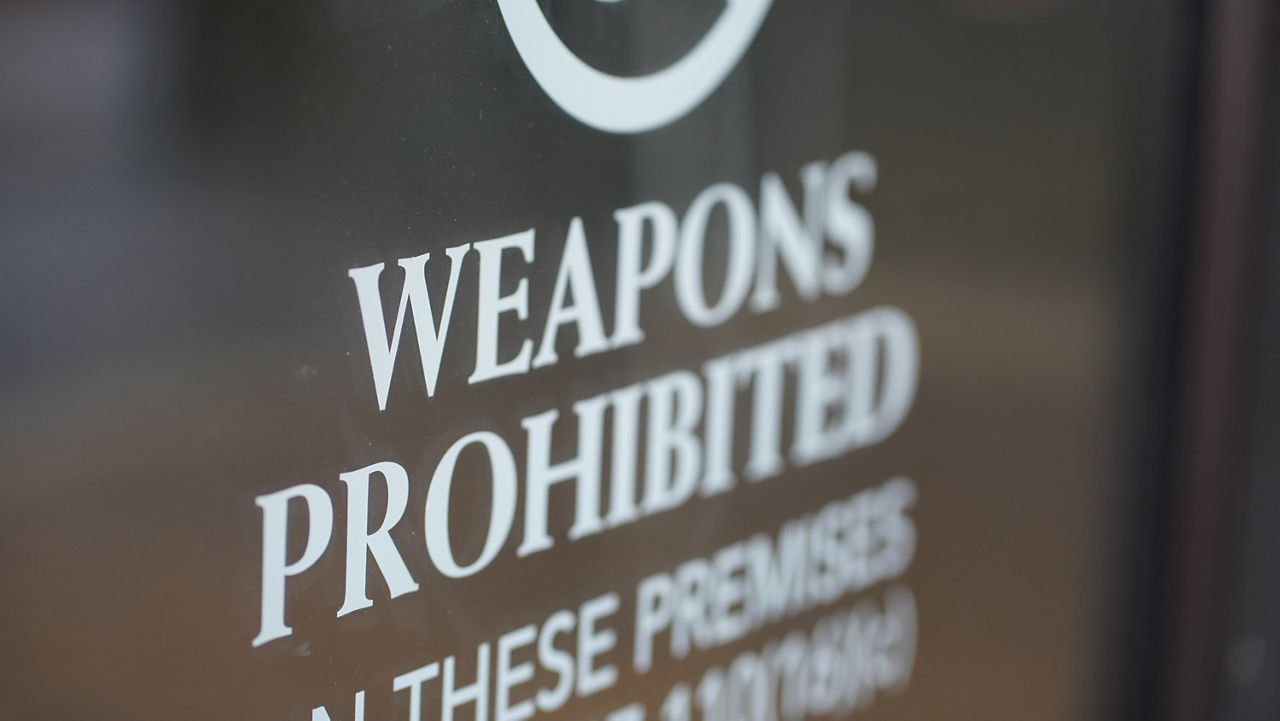LOUISVILLE, Ky. — A group of Jefferson County judges, lawyers and lawmakers say they were surprised by an amendment passed last week in Frankfort.
On Monday, sheriff’s deputies, judges, lawyers and lawmakers gathered to draw attention to an amendment passed last week that would allow any lawyer with a conceal carry permit to bring a gun into a courtroom under any circumstance.
Jefferson County Sheriff John Aubrey is against the change. He described the possibility of a defendant taking a firearm from their lawyer.
“Attorneys and their clients don’t always get along through the whole process and I can see a situation involving, where a defendant who does not agree with his attorney, overpowers him and gets his weapon,” he said. “That’s the first fight. It depends who wins that fight if there is a second fight because if they come out of the room we’re going to be engaging him and our folks are.”
Cassie Drochelman was another voice speaking out against Senate Floor Amendment 2 to House Bill 690. Drochelman is the Interim Executive Director of the Mary Byron Project, a nonprofit advocating for the end of intimate partner violence.
“And I implore the governor to please veto this legislation,” Drochelman said.
Drochelman says emotions can run high in any courtroom and certainly in proceedings regarding domestic abuse.
“This is one of the most stressful situations in a courtroom I would imagine. We’re talking about physical violence often, emotional violence, power and control. Someone who is abusing their partner is seeking to have power and control over them, right? And when that person gains the strength and courage to go to court and try to seek protection from our legal service, that is a signal to their abusive partner they are losing that control, right? And that is when we often see violence escalate,” Drochelman said.

Drochelman said emotions can run high in any courtroom and certainly in proceedings regarding domestic abuse.
“This is one of the most stressful situations in a courtroom I would imagine. We’re talking about physical violence often, emotional violence, power and control. Someone who is abusing their partner is seeking to have power and control over them, right? And when that person gains the strength and courage to go to court and try to seek protection from our legal service, that is a signal to their abusive partner they are losing that control, right? And that is when we often see violence escalate,” Drochelman said.
Drochelman said adding the potential for more guns in the courtroom could even dissuade a victim of violence from seeking legal action.
“Makes it exponentially more dangerous for that person and may keep them from feeling like they can seek that help that they so desperately need,” she said.
Senate Floor Amendment 2 was added to House Bill 690 by Republican Senator Johnnie Turner last Tuesday.
“The floor amendment just clears up some things that adds the attorney general and attorney general employees, along with other licensed judicial people, to be included in what’s now with commonwealth attorney, retired commonwealth county attorney, retired attorneys, so if there is no questions I’d move to adoption of Senate Floor Amendment 2,” Senator Turner said.
Senate Democrat Morgan McGarvey was the lone dissenting vote. McGarvey said it’s clear legislators, including both Republican and Democrat, did not fully understand the ramifications of the rule change.
McGarvey says the language is far too vague, even pointing out Amendment 2 would allow for a lawyer to carry a gun into court even if they are not acting in the capacity of a lawyer.
“If a couple is getting divorced and one of the members of the couple is an attorney, that person can carry a gun into their divorce proceeding,” he said.
Turner, however, issued a statement on Monday defending his decision.
“Licensed attorneys in good standing with the Kentucky Bar Associated should be awarded the same rights and protections as other officers of the court,” he said. “Pursuant to KRS 527.060, KRS 237.110 and KRS 237.138 through 237.142, judges, prosecutors and assistant prosecutors, current law enforcement, and former law enforcement with a concealed carry license are legally allowed to conceal carry in a courthouse. My amendment to HB 690 is consistent with a long-standing practice for officers of the court in Kentucky.”

Turner also stated that he filed the amendment on March 25 and the Senate voted on it on March 29, which gave Democratic leadership, staff, the public and interested parties “four days to review the bill.”
It ultimately passed by a vote of 33-1 with Turner’s amendment attached.
McGarvey points out the vote took place on one of the last two days before the veto period, when lawmakers were discussing or voting on dozens of bills. They are among the busiest days of the session.
Drochelman says the fact that so many law enforcement officers turned out in opposition of the Senate Floor Amendment 2 tells her others think the change is dangerous as well.
Aubrey is asking Gov. Andy Beshear to veto House Bill 690 with the attached amendment and asked Republicans to strongly consider the ramifications if they choose to override the veto as they have the votes do so.
“Governor, on behalf of the law enforcement in the courts, on the streets, I personally request you to veto this bill and then a direct request to the legislators when you come back in session. You think deep and hard overriding the veto,” he said.
